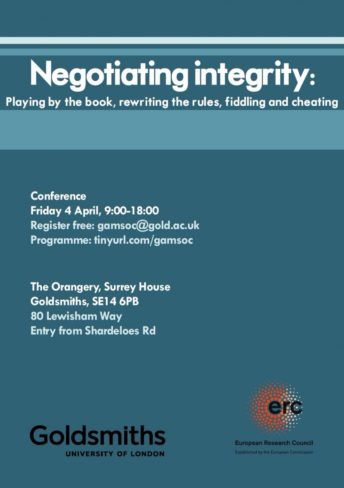Conference at Goldsmiths on April 4th, featuring a keynote by Alex Preda, plus presentations on the manipulative strategies of financial analysts, spread betting odds manipulation, and algorithmic fakes. Registration deadline 21st March.
Negotiating Integrity: Playing by the book, rewriting the rules, fiddling and cheating
 Integrity implies an honest and morally guided compliance to a set of rules and expectations that inform and organise social activities. Integrity can be particularly valorised in contexts characterised by conflicting and/or competing interests. In sportive competitions, for example, athletes are expected to win by respecting and practicing ‘fair play’. In more formal structures, to behave with integrity means to conform to written rules, such as national regulations and professional ethical guidelines. How integrity is conceptualised and practiced varies across different historical and geographical contexts as well as between professional and private domains (and the negotiations between them). Integrity may be anchored in the individual’s sense of rightness, obligations to a larger unit (professional or private) or the demand to abide by specific laws and rules. Negotiating these scales, between the individual and society, may provoke competing, even polarising reactions. When a gambling researcher, for example, accepts acts of hospitality by the gambling industry, is this considered a conflict of interest? Is counting cards at a blackjack table in a casino cheating? Does using one’s position of power to help friends and family count as corruption?
Integrity implies an honest and morally guided compliance to a set of rules and expectations that inform and organise social activities. Integrity can be particularly valorised in contexts characterised by conflicting and/or competing interests. In sportive competitions, for example, athletes are expected to win by respecting and practicing ‘fair play’. In more formal structures, to behave with integrity means to conform to written rules, such as national regulations and professional ethical guidelines. How integrity is conceptualised and practiced varies across different historical and geographical contexts as well as between professional and private domains (and the negotiations between them). Integrity may be anchored in the individual’s sense of rightness, obligations to a larger unit (professional or private) or the demand to abide by specific laws and rules. Negotiating these scales, between the individual and society, may provoke competing, even polarising reactions. When a gambling researcher, for example, accepts acts of hospitality by the gambling industry, is this considered a conflict of interest? Is counting cards at a blackjack table in a casino cheating? Does using one’s position of power to help friends and family count as corruption?
Having integrity often assumes that the rules to be followed are transparent, fair, even obvious, and that to behave ‘properly’ is just a matter of ‘playing by the book’. Negotiating integrity, however, is a more fluid practice. The aim of this conference is to explore how rules are created and what are the different ways of playing by, with and against them. Is manipulating ‘unfair’ rules cheating? Who defines the rules and what processes do they enable and/or suppress? Does compliance with the rules ensure integrity? Can rules be challenged and integrity kept?
For more information and the full programme, see here